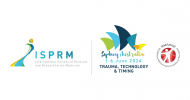Session outline
Lymphoedema & Chronic Oedema are two common comorbidities experienced by individuals undergoing rehabilitation in association with a diverse range of conditions as a primary symptom, or a secondary complication. Lymphoedema & Chronic Oedema can contribute to impairment and disability, impacting mobility and function, and affecting a person’s quality of life. Some of the associated conditions include cancer, stroke, trauma, spinal cord injury, multiple sclerosis, developmental and congenital disorders such as cerebral palsy and spina bifida, obesity, heart failure, and other conditions associated with immobility.
Although we see the condition commonly in practice, there are no clear clinical pathways for assessment, investigation, and management. Lymphoedema & Chronic Oedema does not currently fall under the domain of any specific specialty. However, the principle management of Lymphoedema & Chronic Oedema remains physical intervention with multidisciplinary care. Furthermore, early recognition and implementation of holistic management may be vital in preventing progression of Lymphoedema & Chronic Oedema, in-keeping with the Rehabilitation multidisciplinary model of care.
The aim of this innovative workshop is to provide clinicians working in Rehabilitation with an update on the contemporary understanding of lymphatic anatomy and physiology, and an update on evidence-based strategies in the assessment and management of Lymphoedema & Chronic Oedema associated with common conditions seen in Rehabilitation. This interactive workshop, provided by the Australian Lymphoedema Education, Research and Treatment (ALERT) team, will also include demonstrations of new advancements in imaging and assistive technologies, including Indocyanine Green Lymphography (ICG) imaging, Bioimpedance Spectroscopy and Sequential Intermittent Pneumatic Compression.
Learning outcomes
By the end of the workshop, participants will have an improved understanding of:
- Contemporary concepts in Lymphatic anatomy and physiology and how this differs to previous teachings.
- Contemporary approaches to conservative management of Lymphoedema and Chronic Oedemas.
- The role of surgical in the management of Lymphoedema.
- The role of the multidisciplinary team in the management of Lymphoedema and Chronic Oedemas
- Diagnosis and management of cancer-related Lymphoedema, and non-cancer related Lymphoedema and Chronic Oedemas.
- The importance of surveillance and early intervention in the management of Lymphoedema and Chronic Oedema
- The role of clinical assessment and imaging in the diagnosis and management of Lymphoedema and Chronic Oedema.
- The role of current and emerging assistive technologies in improving the diagnosis and management of Lymphoedema and Chronic Oedema.
Target audience
- Medical practitioners
- Allied health
- Nursing staff
- Trainees
- Students


